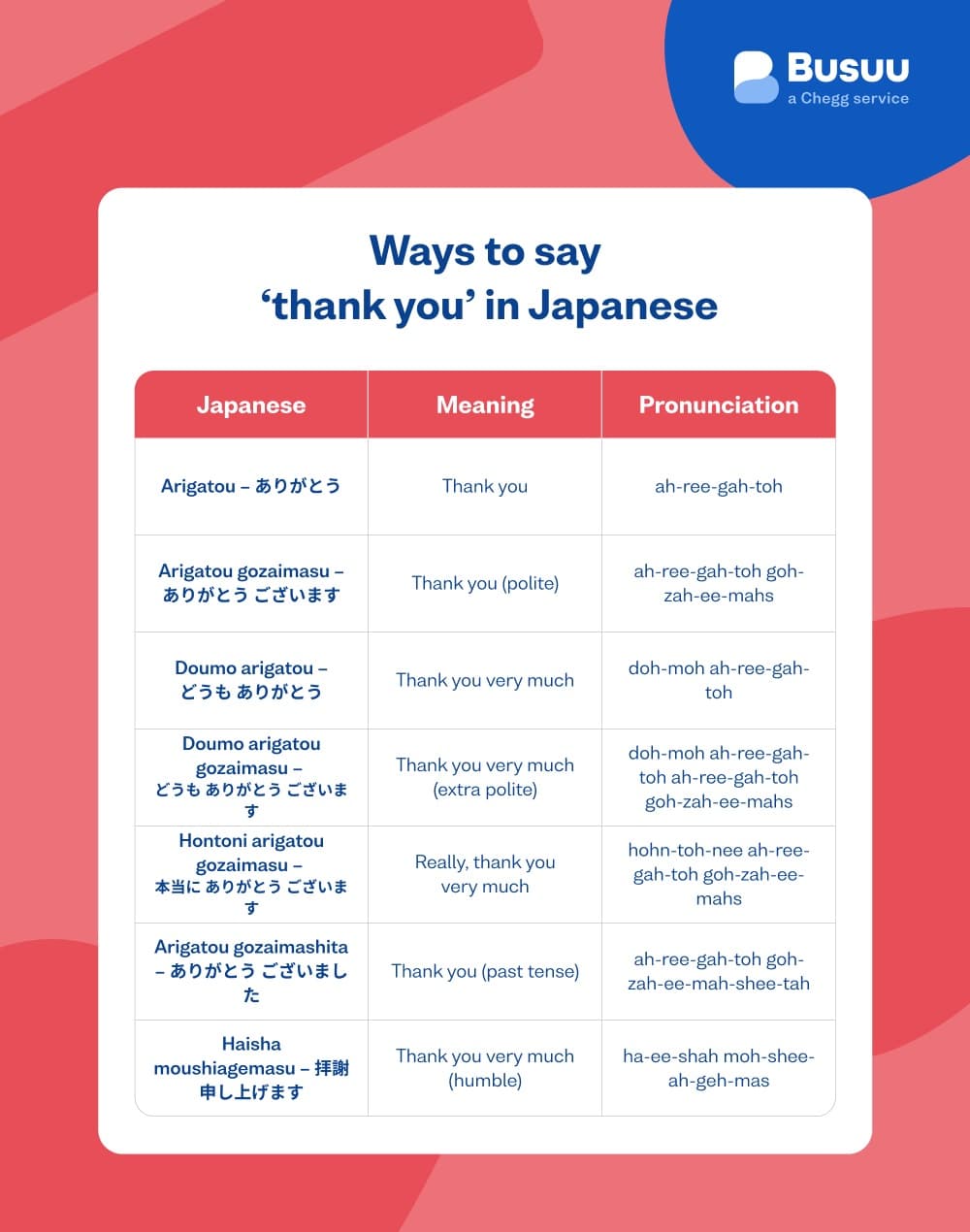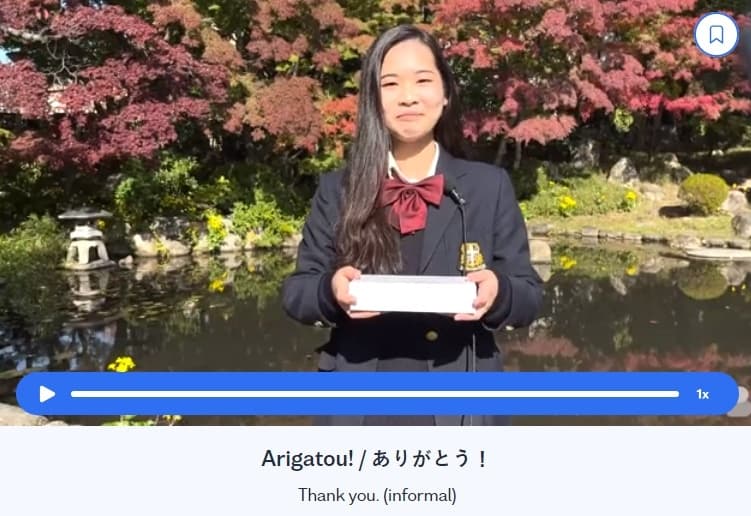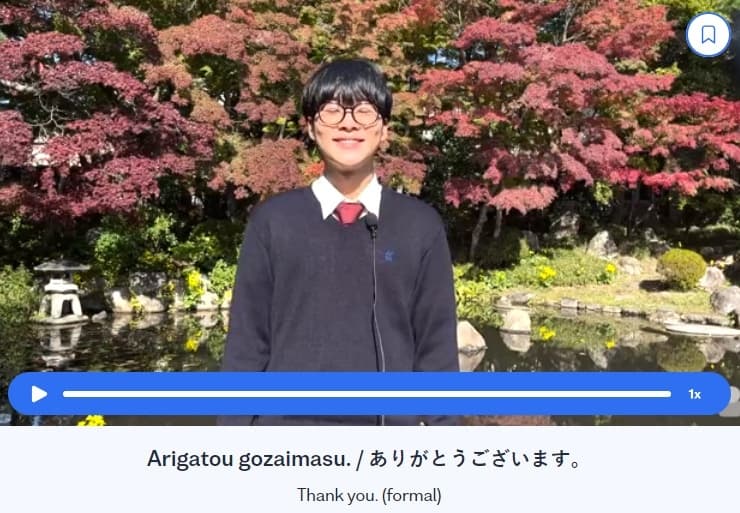I want to learn...
Whether you want to learn Japanese or just master a few key phrases, learning how to say thank you in Japanese is a must.
No matter where you go, learning to say thank you in different languages can make a big difference, but in Japanese culture in particular, expressing your gratitude is a very important part of regular conversation.
And which thank you should you choose? Well, that can get complicated. Did you know that there are different Japanese phrases for different levels of formality? It’s true. In fact, while we’ve gathered up some of the most useful ways to say thank you in Japanese, there are actually many more polite phrases of gratitude you could learn for more specific situations. But these thank yous will certainly get you started!
We’ve broken down the top ways to say thanks and when to use each one. Let’s take a look at 17 ways to say thank you in Japanese.

Thank You in Japanese
The classic:
1. Arigatou – ありがとう
Meaning: Thank you
Pronunciation: ah-ree-gah-toh
About: The short answer to “how do you say thank you in Japanese?” is arigatou. That’s the word that most directly translates to a simple “thank you.” So, if that’s all you wanted, hey, problem solved. But wait – don’t you want to know how to use it correctly and when not to use it?
Whether you want to learn Japanese or just master a few key phrases, learning how to say thank you in Japanese is a must.
Do Japanese people say arigatou?
Yes, they do! Arigatou on its own is a simple, somewhat casual “thank you.” That said, most people prefer doumo arigatou or arigatou gozaimasu as their standard way of saying thanks, because both of those phrases are more polite than arigatou on its own. Children use arigatou on its own, so doing so may make you sound a bit childish or impolite. In general, in Japanese, the longer it takes you to say something, the more polite and formal it is – and being polite is a very good thing.
The more polite variations on the classic:
2. Arigatou gozaimasu – ありがとう ございます
Meaning: Thank you (polite)
Pronunciation: ah-ree-gah-toh goh-zah-ee-mahs
About: This is probably the most handy phrase for thank you. It’s a little more polite than a simple arigatou, making it more work-appropriate, more appropriate for strangers and new friends, and more appropriate for addressing someone who has really helped you. Whilearigatoualone is something you could say casually to a shopkeeper, it could come off a little flippant, and as a foreigner visiting a new place, you want to put your best foot forward.
3. Doumo arigatou – どうも ありがとう
Meaning: Thank you very much
Pronunciation: doh-moh ah-ree-gah-toh
About: This is another slight level up from a plain arigatou, but it’s a little more friendly and casual than arigatou gozaimasu. This would be better for use with friends, family, and younger people to express your gratitude. Doumo on its own can also be used in casual settings, but we’ll get to that later.
4. Doumo arigatou gozaimasu – どうも ありがとう ございます
Meaning: Thank you very much (extra polite)
Pronunciation: doh-moh ah-ree-gah-toh goh-zah-ee-mahs
About: This is the big momma of saying “thank you very much.” Japanese people tend to appreciate a little extra politeness here and there, so if you want to impress upon someone that you’re really grateful, you should toss out adoumo arigatou gozaimasu, maybe with a bow (but we’ll get to bowing later in this article).
FAQ: Should I sayarigatouorgozaimasu?
You should say it all together: arigatou gozaimasu! Arigatouon its own is a casual “thank you,” while gozaimasu is like adding a “very much”. You can’t say gozaimasu on its own, it wouldn’t mean much of anything, but arigatou is a nice quick thanks for casual situations, and arigatou gozaimasu is an excellent way to politely express your thanks.
5. Hontoni arigatou gozaimasu – 本当に ありがとう ございます
Meaning: Really, thank you very much
Pronunciation: hohn-toh-nee ah-ree-gah-toh goh-zah-ee-mahs
About: Addinghontonionto your arigatou gozaimasu is like adding a “really” or “truly” – it’s just a little extra emphasis. This is a little less common, but if you’re looking to mix up your thank yous a little, hontoni is a great addition to jazz things up. It’s polite and adds emphasis.
6. Arigatou gozaimashita – ありがとう ございました
Meaning: Thank you (past tense)
Pronunciation: ah-ree-gah-toh goh-zah-ee-mah-shee-tah
About: This is just like arigatou gozaimasu but is used exclusively for something that’s already completed. For example, you could say it at the end of a business dinner or when someone has completed a service for you (for example, if you were really thankful for a great haircut and wanted to say so on the way out). This can also be used when someone has done you a favor or something along those lines – what matters is that whatever you’re saying thank you for is over and done.
7. Haisha moushiagemasu – 拝謝申し上げます
Meaning: Thank you very much (humble)
Pronunciation: ha-ee-shah moh-shee-ah-geh-mas
About: This is a polite and humble way to say thank you to someone who is above you in social status, especially someone older than you like an elder or a parent. It has a connotation with putting yourself below the person you’re thanking.
FAQ: What is the reply to arigatou?
If you take Japanese lessons, you’ll probably learn that the proper response to arigatou is do itashimashite (どういたしまして), meaning “you’re welcome.” However, that’s very rarely used in modern Japanese conversation except in more formal situations. Instead, you’re much more likely to hear people respond with something like “iie, iie,” meaning “no, no,” or “not at all.”
Thank you for business:
8. Sumimasen – すみません
Meaning: Excuse me, sorry
Pronunciation: soo-mee-mah-sehn
About: When it comes to a more formal thank you in Japanese, you’ll find that many of the phrases include an apology. This is basically a way of including a thank you to the person you’re addressing for their time, care, hard work, attention, and so on. It’s more humble and polite, which is standard in Japanese formal and business speech.
In the case of sumimasen, you’ll usually hear it translated as “sorry” or “excuse me,” but it can be used as a way of saying thanks too, especially in the context of a longer thank you or in a work environment. You’re basically saying, “thank you for doing this despite the inconvenience.” It just isn’t really a direct, one-to-one, translatable word. That’s because Japanese is a context-heavy language, meaning that, in Japanese, a lot of things are implied or use context clues to determine their exact meaning, rather than being said outright. (This comes up especially when we talk about how to say I love you in Japanese!)
So yes, sumimasen is sorry, and excuse me, and thank you, all rolled into one!
9. Osoreirimasu – 恐れ入ります
Meaning: I’m deeply sorry
Pronunciation: oh-soh-rey-ree-mahs
About: This is like a super amped up, much more formal version of what we just talked about above with sumimasen. This is the most formal of the formal “I’m sorry thank yous” and is most commonly used when thanking a superior or client at work. You’re basically thanking someone from the bottom of your heart by apologizing deeply that they’ve been so inconvenienced by doing something for you. This is a pretty heavy duty phrase – it can also be used to express condolences and expresses, to a certain degree, being in awe of the person you’re thanking.
10. Otsukare sama desu – おつかれさまです
Meaning: You must be tired; you’ve worked hard
Pronunciation: oht-soo-kah-reh sah-mah dehs
About: This is a multipurpose phrase, most commonly used at the office. It means something like “good job” or “you’ve been working hard” but is often used as a greeting for colleagues as well as a congratulatory phrase or thank you in Japanese. You could say this if someone did a good job on a presentation you worked on together or to thank them for sending out an email, for example.
Japanese table manners:
These two phrases, itadakimasu and gochisousama deshita are very, very important in Japanese culture! They don’t mean the same thing, but they’re both forms of giving thanks and they’re both considered good manners to say.
11. Itadakimasu – 頂きます
Meaning: I am thankful for this food
Pronunciation: ee-tah-dah-kee-mahs
About: This version of saying “thank you for the food” in Japanese is really something more than a simple thank you. It’s a recognition of the whole chain of food and people that brought the food to your plate. You say it once before you begin eating, often while also bowing your head slightly and putting your hands together, as a grateful and polite acknowledgement of everything that went into your meal. Think of it as thanking the waiter, the chef, the fishmonger, and the fish itself. It’s non-secular and something most Japanese say before every meal.
12. Gochisousama deshita – ごちそうさまでした
Meaning: Thank you for the feast
Pronunciation: go-chee-soh-sah-mah desh-tah
About: Another Japanese thank you for the food phrase, gochisousama deshita is the partner to itadakimasu, but this phrase comes after the meal and is more directly addressing the people who cooked and served you the food. You’re basically saying that you really appreciate it and that they gave you enough food. Like, “Wow! What a meal!” You can also use it to thank the person who picked up the bill, but be careful – saying it to someone before they’ve paid or offered to pay can come across as cheeky and presumptuous, like you’re expecting them to pay for you.
You can say gochisousama deshita to your host at the end of a dinner party, or quickly to a chef or serve in passing as you exit a restaurant – but be cool about it, you can just call it out if they’re busy, you don’t need to stop someone and have them look you in the eye for it to count! If you’ve had a more casual meal or are visiting close friends or family, you can shorten it to gochisou or gochisousama, but generally it’s better to err on the side of being more polite than less.
Casual thanks in Japanese:
13. Doumo – どうも
Meaning: Thanks
Pronunciation: doh-moh
About: For a fun, casual “thanks,” a simple doumo (from doumo arigatou) is a popular option. This is useful for thanking close peers and friends, but would be a little casual for the workplace. You’ll hear it most often used among younger people, including in informal cafés, pubs, and shops, but should opt for something more polite in more formal contexts, like nice restaurants or at the office.
14. Sankyu (English) – サンキュー
Meaning: Thank you
Pronunciation: Sankyu is a Japanese slang version of the English “thank you”
About: This is very much a cool kid, slangy phrase that you might hear among young people, especially young men. As an English speaker, you should probably stick with just saying “thank you” or one of the other options on this list, but we’re including it in case you come across it in the wild!
Fun fact: The same sound combination, san kyuu, also means the number 39. San is three and kyuu is nine. So if you’re not sure why someone’s saying they need thank you chairs, you might be looking for the other san kyuu.
15. Azasu – あざす
Meaning: Thanks! Cheers! (Cheers in the thanks sense, not in the drinking sense!)
Pronunciation: ah-zahs
About: Azasu is a super shortened arigatou gozaimasu, used mostly by school kids, in anime, and by young people hanging out with friends. This is informal slang for a quick thanks and shouldn’t be used with strangers or anywhere where someone might be offended by your lack of politeness (so not at work or with elders!).
When actions speak louder than words:
16. Bowing
Bowing culture in Japan dates back well over 1,000 years, so to be honest, you might not master all the intricacies on your first try, but that doesn’t mean you shouldn’t try to learn!
Bowing is used to say all sorts of things, from a quick acknowledgement of a shopkeeper to a deep bow of gratitude or respect. And saying thanks is certainly one way that bows are used.
In Japan, you bow from the waist and keep your back straight. The greater the angle of the bow, the more humble and respectful it is. Men keep their arms at their sides and women can do the same or fold one hand on top of the other in front of the body, below the belly button.
Most commonly, you would bow about 15 degrees for a casual bow or about 30 degrees in work situations, when greeting clients, and other more formal occasions. The deepest bow is more like 45 degrees and would only be used in a situation where you were deeply grateful, meeting someone very important, or apologizing for something big (like if you broke a treasured vase or needed a big favor).
17. Gifts
Gifting is also an important and complex aspect of Japanese culture and can be used as a way to say thank you. There are two times of year when it’s traditional to give gifts of gratitude in Japan, Ochugenin the summer and Oseibo at the end of the year. These would be the best times to give something in gratitude to a parent, teacher, co-worker, or manager that you feel you owe some gratitude. But that doesn’t mean you absolutely can’t give gifts another time of year.
Just know that you may be starting an endless cycle of minor gifting if you give someone something: small gifts given at other times, called okaeshi, are usually given sometime after someone gives you a gift and should total about half the value of whatever you received. This even extends to little things – for example, if your neighbor brings you food, it would be polite and normal to return the container with something in it to show your thanks!
If you receive a gift, don’t forget to accept it with both hands and wait until later to open it. And if you’re giving a team or a family something, know that it’s considered rude not to get everyone a gift.
Now you know the best ways to say thank you in Japanese
There you have it. You’re ready to dole out gratitude in Japanese like some sort of thanks fairy! Feel like you learned something?
Newlanguages


